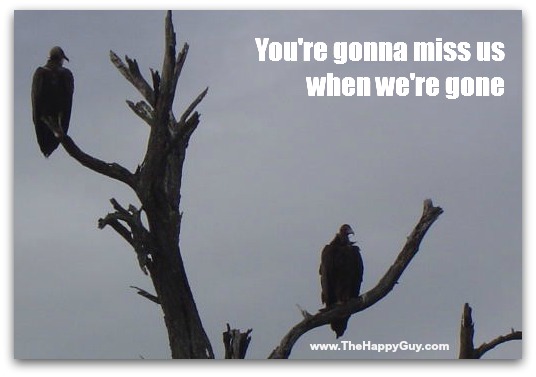The vulture shortage really did happen. It was a few years ago, but 100 percent true. As for the rest of the story…
Uncle Filbert and I were engaging in some leisurely small talk about the usual topics: what to eat for dinner, how the children were growing, the odd weather we’ve been having lately, and of course, the severe vulture shortage in India.
“It really has placed the country in quite a pickle,” Uncle Filbert observed.
I agreed. “Whatever will they do for Thanksgiving next year?”
“It’s a vulture shortage, not a turkey shortage,” Uncle Filbert explained.
“Well, at least they’ll have the pickle.”
Uncle Filbert ignored my wisecrack. “It is a serious, serious, serious affair. Carcasses are littering the streets.”
“Vulture carcasses?” I asked, trying to picture cyclists negotiating an obstacle course of knee-high black-feathered mounds.
“No, cow carcasses,” Uncle Filbert answered.
“Cow carcasses?” I was puzzled. “Cows don’t eat vultures. Er … do they?
“No.” Uncle Filbert assured me. “The majority of Indians are Hindus, and they neither eat nor kill cattle. I am sure it is against the law for cows to die. But cows aren’t too well versed on legal technicalities, and they go ahead and die just the same. Indians rely on vultures to clean up the mess, mess, mess.”
“Why don’t they just ship the dead cattle to America? People can’t get enough beef there.”
“You don’t understand,” Uncle Filbert cried, waving his hands. “Cows are sacred to Hindus. Imagine the sacrilege if McDonald’s got their hands on holy Hindu cattle.”
“Holy cow!” I exclaimed.
“Everything has a value. Everything is useful,” Uncle Filbert said.
“Even car alarms that won’t shut off?” I asked.
“I mean that without the vultures to eat the rotting cow carcasses, India’s environment is getting dirty, dirty, dirty. Hygiene has become as scarce as two-dollar movie passes and disease is banging down the door with a big, loud cow bell,” Uncle Filbert explained. “Imagine what would happen if America had a similar vulture shortage.”
America’s vulture culture
“We have vultures?” I asked?
“Of course we do. We give them gold plated briefcases and law degrees, then we set them free to keep the ambulance population under control.”
“Really? How do they do that?” I asked.
“They help accident victims sue each other,” Uncle Filbert explained. “Imagine for just a minute what would happen if America had a vulture shortage of its own.”
I thought about it for a moment. “Wouldn’t that be a good thing?”
Without lawyers, would there be decaying ambulance flesh all over our highways and icy front steps in winter? http://t.co/yjFi3mOfeR
— David Leonhardt (@amabaie) January 4, 2014
“No, no, no.” My uncle cried. “It would be disaster. It would be horrible. The entire economy would collapse.”
“It would?”
“Yes, everything has a value – even lawyers. I know people like to crack cruel jokes about them, and you’ll probably throw a jab or two at their expense in your blog, but they really are useful.”
“They are?” I asked.
“Of course. We rely on the vultures to clean up the rotting ambulance carcasses. Without them, there would be decaying ambulance flesh all over our highways and icy front steps in winter. It would be an environmental disaster. Dirty, dirty, dirty.”
“What if we just stop blaming each other?” I wanted to know. “What if, when we slip on ice, we just close our eyes and imagine that it has something to do with the cold weather – you know, a natural occurrence, rather than a diabolical plot at City Hall to give everybody a sore tushy?”
“Saints alive! Don’t pronounce that word in your blog. Somebody will surely sue you,” Uncle Filbert panicked.
“What word?” I asked.
“Tushy. Yikes! I just said it, too.”
“But you also just said that everything has a value, that everything is useful,” I countered. “Even tushies. And even vultures. I suppose that means that even decaying cow carcasses must be useful for something.”
“Let’s just hope that the fast food chefs don’t find out.”




I thought the vultures became the hedge fund operators that purchase companies, strip out the employees, steal all the cash, and then sell them to the public to figure out what they bought…